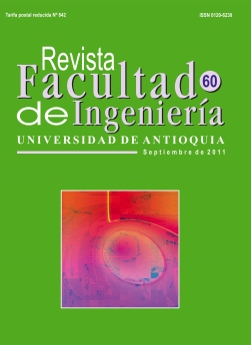A ripple-mitigating pre-amplifier based on interleaved DC-DC boost converters for efficiency improvement
DOI:
https://doi.org/10.17533/udea.redin.13749Keywords:
pre-amplifier, interleaved converters, efficiency improvement, ripple mitigationAbstract
An efficient pre-amplifier based on interleaved DC-DC boost switching converters to mitigate high-frequency harmonics injection to power sources is proposed. The main features of the pre-amplifier are mitigate the ripple of power converters input-current and improving the efficiency of the whole power conversion chain. The pre-amplifier optimal operating conditions are calculated, and the circuit is modeled and controlled to operate in such conditions. The pre-amplifier interacting with a classical single boost is analyzed, obtaining a strong reduction in the current ripple injected to the source, and also improving the efficiency of the initial conversion system. Finally, the theoretical analyses are confirmed by means of circuital PSIM simulations and experimental results.
Downloads
References
W. A. Surdoval, S. C. Singhal, G. L. McVay. The Solid State Energy Conversion Alliance SECA, U.S. Department of Energy Initiative to Promote the Development of Mass Customized Solid Oxide Fuel Cells for Low-Cost Power. The 7th International Symposium on Solid Oxide Fuel Cells. Tsukuba. 2001. pp. 1-10.
V. Acquaviva, P. Poggi, M. Muselli, Louche. “GridConnected Rooftop PV Systems for Reducing Voltage Drops at End”. Energy. Vol. 25. 2000. pp. 741-756. DOI: https://doi.org/10.1016/S0360-5442(00)00011-6
P. T. Krein, R. S. Balog, X. Geng. “High-frequency link inverter for fuel cells based on multiple-carrier pwm”. IEEE Trans. Power Electron. Vol. 19. 2004. pp. 1279- 1288. DOI: https://doi.org/10.1109/TPEL.2004.833996
C. Liu, A. Johnson, J. Lai. Modeling and control of a novel six-leg three-phase high power converter for low voltage fuel cell applications. IEEE Power Electron. Spec. Conf. Aachen. 2004. pp. 4715-4721.
C. Cabal, C. Alonso, A. Cid-Pastor, B. Estibals, L. Seguier, R. Leyva, G. Schweitz, J. Alzieu. Adaptive digital MPPT control for photovoltaic applications. IEEE International Symposium on Industrial Electronics. Vigo. 2007. pp. 2414-2419. DOI: https://doi.org/10.1109/ISIE.2007.4374985
C. Cabal, A. Cid-Pastor, L. Seguier, B. Estibals, C. Alonso. Improved photovoltaic conversion chain with interleaved method. IEEE Power Electron. Spec. Conf. Island of Rhodes. 2008. pp. 70-75. DOI: https://doi.org/10.1109/PESC.2008.4591899
C. Haynes, W. J. Wepfer. “Characterizing heat transfer within a commercial-grade tubular solid oxide fuel cell for enhanced thermal management”, Int. J. Hydrogen Energy. Vol. 26. pp. 369-379. DOI: https://doi.org/10.1016/S0360-3199(00)00051-3
G. Grandi, D. Casadei, C. Rossi. “Direct coupling of power active filters with photovoltaic generation systems with improved MPPT capability”. IEEE Power Tech Conf. Proceedings. Vol. 2. 2003. pp. 23-26.
E. Mamarelis, C. A. Ramos-Paja, G. Petrone, G. Spagnuolo, M. Vitelli. FPGA-based controller for mitigation of the 100 Hz oscillation in grid connected PV systems. IEEE International Conference on Industrial Technology ICIT. Viña del Mar. 2010. pp. 925-930. DOI: https://doi.org/10.1109/ICIT.2010.5472556
S. J. Jang, C. Y. Won, B. K. Lee, J. Hur. “Fuel cell generation system with a new active clamping currentfed half-bridge converter”. IEEE Trans. Energy Conversion. Vol. 22. 2007. pp. 332-340. DOI: https://doi.org/10.1109/TEC.2006.874208
W. Erickson, D. Maksimovic. Fundamentals of Power Electronics. 2nd ed. Ed. Kluwer Academic Publishers. New York. 2001. pp. 39-77.
R. Giral, L. Martinez-Salamero, R. Leyva, J. Maixe. “Sliding-mode control of interleaved boost converters”. IEEE Trans. on Circuits and Systems I. Vol. 47. 2000. pp.1330-1339. DOI: https://doi.org/10.1109/81.883328
Downloads
Published
How to Cite
Issue
Section
License
Copyright (c) 2018 Revista Facultad de Ingeniería

This work is licensed under a Creative Commons Attribution-NonCommercial-ShareAlike 4.0 International License.
Revista Facultad de Ingeniería, Universidad de Antioquia is licensed under the Creative Commons Attribution BY-NC-SA 4.0 license. https://creativecommons.org/licenses/by-nc-sa/4.0/deed.en
You are free to:
Share — copy and redistribute the material in any medium or format
Adapt — remix, transform, and build upon the material
Under the following terms:
Attribution — You must give appropriate credit, provide a link to the license, and indicate if changes were made. You may do so in any reasonable manner, but not in any way that suggests the licensor endorses you or your use.
NonCommercial — You may not use the material for commercial purposes.
ShareAlike — If you remix, transform, or build upon the material, you must distribute your contributions under the same license as the original.
The material published in the journal can be distributed, copied and exhibited by third parties if the respective credits are given to the journal. No commercial benefit can be obtained and derivative works must be under the same license terms as the original work.










 Twitter
Twitter